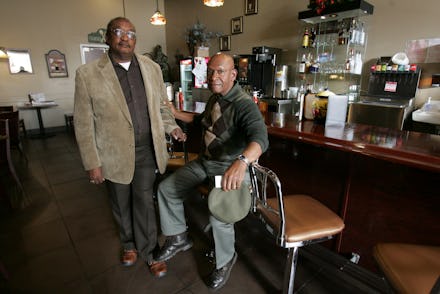More Than 50 Years Later, These Civil Rights Icons Finally Got the Justice They Deserve

It took five decades, but nine men who staged a sit-in at a Rock Hill, South Carolina, lunch counter have finally received justice.
The "Friendship Nine," named because eight of the men were students at Friendship Junior College, went to jail after staging a sit-in at the segregated McCrory's lunch counter in 1961. More than 53 years later, Reuters reports officials decided that the time had come to make it clear that protesting against segregation is no crime.
Judge John C. Hayes III, the nephew of the judge who presided over the original trial of the Friendship Nine, signed an order vacating the convictions. "We cannot rewrite history, but we can right history," Hayes said to the surviving men, who brought along Ernest Finney Jr., a former civil rights lawyer and the first black chief justice of the South Carolina Supreme Court, as their attorney.
The men — John Gaines, Thomas Gaither, Clarence Graham, Willie Thomas "Dub" Massey, Willie McCleod, Robert McCullough, James Wells, David Williamson and Mack Workman — received national attention for implementing the previously untested "jail, no bail" tactic. In previous sit-ins and demonstrations across the segregation-era South, protesters would be arrested, fined and then released in a cycle that gave local police departments lucrative revenue streams and incentivized the frequent arrest of protesters. The Friendship Nine resolved to change that by electing to serve time performing hard labor, rather than get out of jail early with a fine.
Not only did the town of Rock Hill miss out on collecting more than $1,000 in fines, it also had to pay to house and feed the protesters. The men completed their sentence of 30 days of hard labor, and the "jail, no bail" tactic was added to the arsenal of civil rights activists around the country.
Graham, 72, told Reuters that the group's efforts weren't for glory.
"We were simply ... students who were tired of the status quo, tired of being treated as second-class citizens. Even though we were treated unjustly, still nonviolence prevailed," Graham said. "That's our message to young people."
h/t Reuters